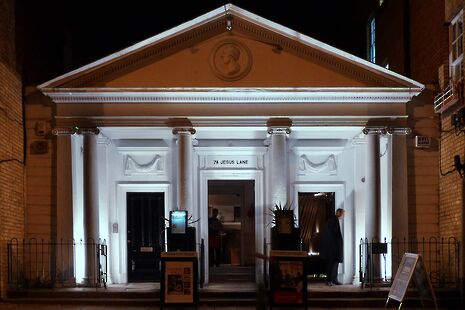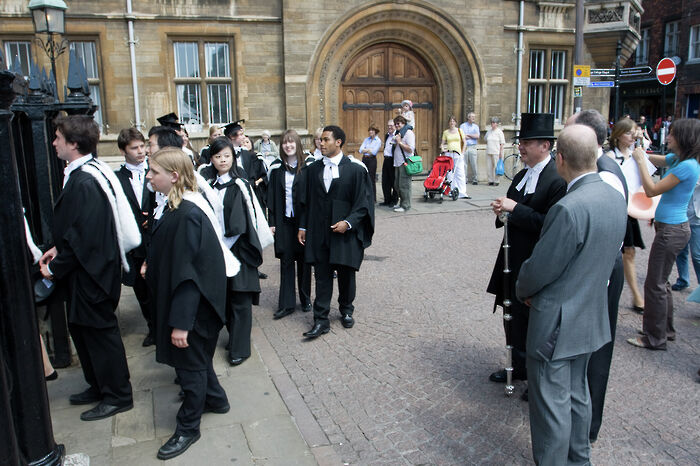Allowing women into the Pitt Club should not be celebrated
Eve Hodgson argues that the Pitt Club’s recent admittance of women has done little to combat its exclusionary and out-dated image

Women should be allowed where men are. That is a very basic tenet of equality that we demand of most of our institutions. When the Pitt Club announced its decision to allow women to be elected, I wasn’t especially impressed, and I don’t really think anybody else should be either.
Exclusion from space on the grounds of gender is a complicated discourse, especially when we still have all-women’s colleges. However, women-only spaces like colleges or discussion groups can be and often are defended on the grounds of safety and even necessity for the women involved.
Women did not have the right to a full university education for a long time after men, therefore colleges that cater to that deficit are arguably defensible. Women are often silenced in public discussion about their lives and experiences, so creating a space in which only they speak – and cannot be shouted over or drowned out – can be explained very legitimately.
“Allowing women to enter this boys’ club does not make it any less of a marker of… endemic economic and social privilege”
However, men’s only spaces, especially when founded in the principles of leisure that the Pitt Club is, more often serve to be exclusionary – working to the negative purpose of being anti-woman where female-only spaces tend not to be anti-man. The Pitt Club allowing women to be elected, therefore, is not a victory of the political correctness brigade, as some of its old members seem to believe it to be.
Just to say, I don’t hate these sorts of clubs, as the same commentator claims people will regardless of whether women are included. I don’t like what they represent, but if people choose to spend their time and money at them, that’s really none of my business.
But to even have alumni make this complaint highlights the immense privilege and even naivety intrinsic to the institution. Complaints about political correctness always seem to fall into this trap of fundamental ignorance. Whether it’s complaining about diversity quotas in the media or not being able to inappropriately touch your colleagues at work, there is a failure of realisation. The penny never drops that change is happening because the complainer or complainers have unjustly benefitted from a system that has coddled them and their wants for so long that everyone else is fed up.
Regardless of what genders are permitted in, the Pitt Club is a members’ club, made up of already-formed networks of people. Allowing women to enter this boys’ club does not make it any less of a marker of the endemic economic and social privilege we already know to be present in Cambridge.
Certainly, we should applaud anything that looks like a step forward for equality, and some people might think that’s what this is. I don’t. It might be equality in a very small space, but the space itself is a symptom of wider inequalities – not very many people are going to benefit from a very small number of women being allowed to join a very small number of men.
Organisations like the Pitt Club, often compared to Oxford’s Bullingdon Club, are emblematic of exclusionary privilege. That’s really what they’re for, to create the sense of an inner circle to which one is not only fortunate, but worthy, to be elected to. If other people aren’t there, it’s because they didn’t deserve it.
Environments like this create exclusivity based on nothing but social circles and financial privilege, and make that kind of exclusivity acceptable. Cambridge in itself is already seen as an exclusive environment to the point of detriment – clubs like these only add to our combined public image of poshness, richness, and basically, snobbery.
Although the Pitt Club is often defended by its past members, claiming it is nowhere near as riotous as the Bullingdon Club, the culture of private clubs is what makes them intrinsically harmful.
The film The Riot Club is often derided as a ridiculous presentation of Oxbridge students, often by Oxbridge students. This is problematic in two ways. Firstly, these presentations are a reflection of the way people see us, and the way they continue to see us. Secondly, I’d say they aren’t all that ridiculous. I watched The Riot Club after two terms at Cambridge, and while, obviously, the behaviours aren’t comparable, the underlying sentiments – of entitlement, superiority, segregation – are.
I’m not saying don’t be intrigued, or even don’t join. But we need to be aware of the culture we collectively perpetuate. Women or not, members of the Pitt Club are part of something special – special on the grounds that so few are let in, and so many excluded
 Interviews / ‘People just walk away’: the sense of exclusion felt by foundation year students19 April 2024
Interviews / ‘People just walk away’: the sense of exclusion felt by foundation year students19 April 2024 News / Copycat don caught again19 April 2024
News / Copycat don caught again19 April 2024 News / AMES Faculty accused of ‘toxicity’ as dropout and transfer rates remain high 19 April 2024
News / AMES Faculty accused of ‘toxicity’ as dropout and transfer rates remain high 19 April 2024 Theatre / The closest Cambridge comes to a Drama degree 19 April 2024
Theatre / The closest Cambridge comes to a Drama degree 19 April 2024 News / Acting vice-chancellor paid £234,000 for nine month stint19 April 2024
News / Acting vice-chancellor paid £234,000 for nine month stint19 April 2024





